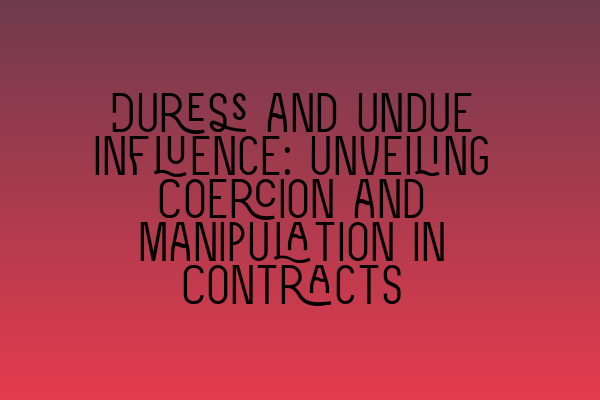Duress and Undue Influence: Unveiling Coercion and Manipulation in Contracts
Welcome to our blog post on the fascinating and complex topic of duress and undue influence in contract law. In this article, we will delve into the intricacies of these legal concepts and explore their significance in contractual relationships. Understanding the implications of duress and undue influence is crucial for both solicitors and clients alike, as they can greatly impact the validity and enforceability of contracts.
Before we dive into the details, let’s briefly define the terms:
What is Duress?
Duress refers to a situation where one party is forced or coerced into entering into a contract against their will. It involves the use of threats, violence, or other forms of pressure to manipulate the other party into agreeing to the terms of the contract. Duress renders a contract voidable, meaning the innocent party has the option to either affirm or rescind the contract based on the circumstances.
What is Undue Influence?
Undue influence occurs when one party exerts an excessive and unfair level of persuasion or control over the other party, leading to the dominance of one person’s will over the other. Unlike duress, undue influence may not involve direct threats or coercion but rather the manipulation of the vulnerable party’s decision-making process. As a result, the influenced party may unknowingly enter into a contract that does not reflect their true intentions. Contracts tainted by undue influence are also considered voidable.
Now that we have a basic understanding of these concepts, let’s explore some common scenarios where duress and undue influence may arise:
1. Economic Duress
Economic duress occurs when one party exploits the financial vulnerability of another party to extract unfair concessions or force them into a contract. This often involves threats to withhold payment, cancel existing contracts, or take legal action. It is essential for solicitors to recognize signs of economic duress and advise their clients accordingly to protect their interests.
2. Physical Duress
Physical duress involves the use of force or the threat of physical harm to compel someone to enter into a contract. Such situations can arise in criminal activities, hostage situations, or acts of intimidation. It is crucial for solicitors to address cases involving physical duress with great sensitivity and take the necessary legal action to protect their clients.
3. Unconscionable Bargains
Undue influence often manifests in the form of unconscionable bargains, where one party takes advantage of the other party’s vulnerability, lack of knowledge, or impaired judgment. This could occur when dealing with elderly individuals, those with mental disabilities, or individuals in a dire financial situation. Solicitors must be vigilant in identifying these situations and ensuring their clients are protected from unfair agreements.
4. Intra-Familial Relationships
Undue influence is particularly prevalent in intra-familial relationships, such as parent-child, guardian-ward, or spouse-spouse relationships. The nature of these relationships often creates an imbalance of power, making the vulnerable party susceptible to manipulation by the dominant party. Solicitors should handle such cases delicately and ethically to protect the rights and interests of their clients.
It is important to note that proving duress or undue influence in a contract can be challenging. However, by presenting compelling evidence and utilizing relevant legal precedents, solicitors can effectively build a case to support the claim of coercion or manipulation. If successful, the contract may be set aside, rescinded, or modified to rectify the unfairness.
By understanding the intricate nature of duress and undue influence, solicitors can navigate the complexities of contract law and provide valuable guidance to their clients. Whether you are studying for the SQE exams or looking for practical guidance on contract law, our related articles below can provide you with additional resources and information on exam preparation and course options:
- SQE 1 Practice Exam Questions
- SQE 1 Practice Mocks FLK1 FLK2
- SQE 2 Preparation Courses
- SQE 1 Preparation Courses
- SRA SQE Exam Dates
Thank you for taking the time to explore the intriguing world of duress and undue influence in contracts. Should you require legal assistance in this matter or any other contract-related issues, do not hesitate to contact us at SQE Contract Law. Our team of expert solicitors is ready to assist you in protecting your rights and interests.
Please note that this blog post is for informational purposes only and does not constitute legal advice.
